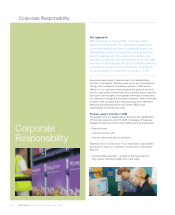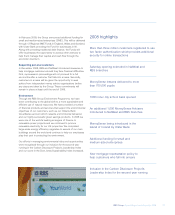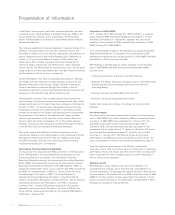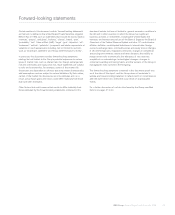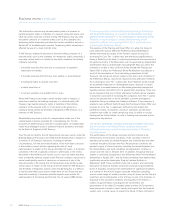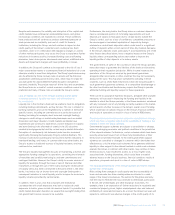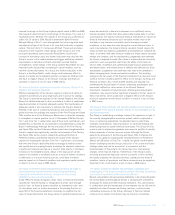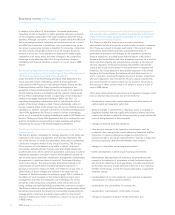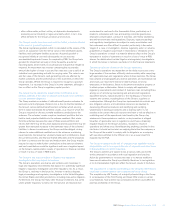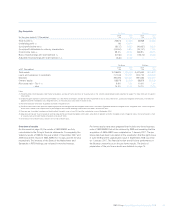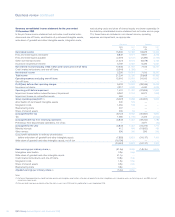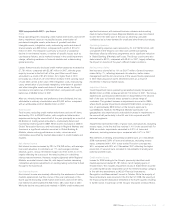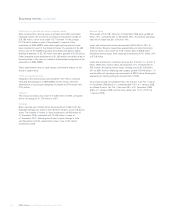RBS 2008 Annual Report Download - page 29
Download and view the complete annual report
Please find page 29 of the 2008 RBS annual report below. You can navigate through the pages in the report by either clicking on the pages listed below, or by using the keyword search tool below to find specific information within the annual report.
RBS Group Annual Report and Accounts 200828
Business review continued
The stabilisation options may be exercised by means of powers to
transfer property, rights or liabilities of a relevant entity and shares and
other securities issued by a relevant entity. HM Treasury may also take
the parent company of a relevant entity (such as the company) into
temporary public ownership provided that certain conditions set out in
Section 82 of the Banking Act are met. Temporary public ownership is
effected by way of a share transfer order.
If HM Treasury makes the decision to take the holding company of a
relevant entity, such as the company, into temporary public ownership, it
may take various actions in relation to securities issued by the holding
company, including:
•to transfer securities free from any or contractual or legislative
restrictions on transfer;
•to transfer securities free from any trust, liability, or encumbrance;
•to extinguish rights to acquire securities;
•to delist securities; or
•to convert securities into another from or class.
Where HM Treasury has made a share transfer order in respect of
securities issued by the holding company of a relevant entity, HM
Treasury may transfer property, rights or liabilities of the holding
company of the relevant entity or of any bank in the group to a
company wholly owned by the Bank of England or HM Treasury, or a
nominee of HM Treasury.
Shareholders may have a claim for compensation under one of the
compensation schemes provided for in the Banking Act. For the
purposes of determining an amount of compensation, an independent
valuer must disregard actual or potential financial assistance provided
by the Bank of England or HM Treasury.
Over the last six months, the UK Government has taken action under the
Banking (Special Provisions) Act 2008 and the Banking Act in respect of
a number of UK financial institutions, including in extreme
circumstances, full and part nationalisation. There have been concerns
in the market in recent months regarding the risks of such
nationalisation in relation to the Group and other UK banks. If economic
conditions in the UK or globally continue to deteriorate, or the events
described in the following risk factors occur to such an extent that they
have a materially adverse impact on the financial condition, perceived or
actual credit quality, results of operations or business of any of the
relevant entities in the Group, the UK Government may decide to take
similar action in relation to the Group. Given the extent of HM Treasury’s
and the Bank of England’s powers under the Banking Act, it is difficult
to predict what effect such actions might have on the Group and any
securities issued by it. However, potential impacts may include full
nationalisation of the Group and the total loss of value in RBS shares.
If the company does not raise sufficient capital through the Placing
and Open Offer (including as a result of the Resolutions not being
approved or the termination of the underwriting commitments of HM
Treasury), it may be unable to access additional funds or find
alternative methods of increasing its Core Tier 1 capital ratio and
redeeming the Preference Shares.
The purpose of the Placing and Open Offer is to allow the Group to
raise sufficient funds to effect the Preference Share Redemption,
thereby improving the quality of the Group’s capital structure by
increasing its Core Tier 1 capital ratio and enhancing significantly its
financial flexibility in the face of continuing turbulence and uncertainty in
the global economy. If the Resolutions are not approved by independent
shareholders (that is, shareholders excluding HM Treasury) and/or the
company is unable to raise sufficient funds through the Placing and
Open Offer to effect the Preference Share Redemption (including as a
result of the termination of the underwriting commitment of HM
Treasury), the Group will remain subject to the terms and conditions of
the Preference Shares, and will be required to find alternative methods
for increasing its Core Tier 1 capital ratio. Such methods could include
an accelerated reduction in risk-weighted assets, disposal of certain
businesses, increased reliance on alternative government supported
liquidity schemes and other forms of government assistance. There can
be no assurance that any of these alternative methods will be available
or would be successful in increasing the company’s Core Tier 1 capital
ratio to the desired level or on the timetable currently envisaged or
enable the Group to redeem the Preference Shares. If the company is
unable to raise sufficient funds through the Placing and Open Offer and
increase its Core Tier 1 capital ratio sufficiently and redeem the
preference shares, its business, results of operations and financial
condition may suffer, its credit ratings may drop, its ability to access
funding will be further limited, its cost of funding may increase and its
share price may decline.
The Group’s businesses, earnings and financial condition have been
and will continue to be affected by the continued deterioration
in the global economy, as well as ongoing instability in the global
financial markets.
The performance of the Group has been and will continue to be
influenced by the economic conditions of the countries in which it
operates, particularly the United Kingdom, the United States and other
countries throughout Europe and Asia. Recessionary conditions are
present in many of these countries, including the United Kingdom and
the United States, and such conditions are expected to continue or
worsen over the near to medium term. In addition, the global financial
system is continuing to experience the difficulties which first manifested
themselves in August 2007, and the financial markets have deteriorated
significantly since the bankruptcy filing by Lehman Brothers in
September 2008. These conditions have led to severe and continuing
dislocation of financial markets around the world and unprecedented
levels of illiquidity, resulting in the development of significant problems
at a number of the world’s largest corporate institutions operating
across a wide range of industry sectors, many of whom are the Group’s
customers and counterparties in the ordinary course of its business. In
response to this economic instability and illiquidity in the market, a
number of governments, including the UK Government, the
governments of the other EU member states and the US Government,
have intervened in order to inject liquidity and capital into the financial
system, and, in some cases, to prevent the failure of these institutions.


